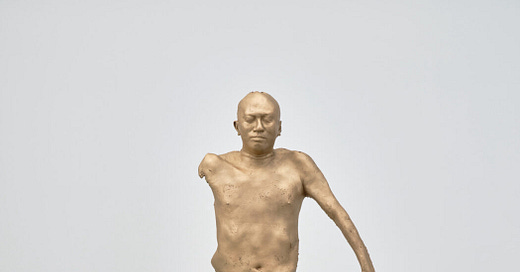Art World Undercover #4, Naotaka Hiro at Bortolami Gallery, by Adam Lehrer
Adam Lehrer goes undercover and finds Naotaka Hiro to, regardless of his ideological limitations, be an artist with much to say about the beauty of failure
I like to see failure, even though I get completely depressed. The failure is a beauty for me. – Naotaka Hiro
Amongst the countless ideas that define the worldview and movement that I’ve taken to calling the Counter-Agency of the Avant-Garde is a fascination with and, to an extent, embracing of failure. Artaud, whose ideas are so fundamental to our mission, believed that the possibility of failure was pre-conditional for the transcendent value of theater or art; the Theater of Cruelty deprioritized the stage play and the text to place value upon movement, space and an invisible language that could develop according to the bodies on stage and in the audience. Without the strict control of a text guiding forth the production, the possibility of failure grows exponentially – and so does the possibility for transcendence. The possibility to experience desire beyond the limitations of the body and, thus, as (excuse the over-reliance on cliché philosophical terms here) as Deleuze and Guattari’s Body Without Organs (the phrase of course appropriated from Artaud’s utterly fucked radio play To Have Done with the Judgement of God.) Failure produces forward momentum. Accidents yield new form. The surrealist and their automatist writings – thoughts direct to page – ejaculation of content – a new method of literature. Burroughs and Gysin and the cut-up. More recently, the drummer and musician Adam Stonehouse of the SF-based noisy punks The Hospitals produced one of the most radical rock n’ roll albums of the 2000s in Hairdryer Peace — a deconstructionist rock artifact worthy of White Light/White Heat and Troutmask Replica — but when asked about his aesthetic aims in making the album, the artist said he simply wanted it so sound like AC/DC or ZZ Top. It was the man’s goal to achieve the virtuosic precision of the classic rock gods and that seismic ambition eroded by his own technical limitations created an entirely new musical form. Rejoice! We refuse to bow to cowardice and safety and long for the madness that erupts from the erosion of preexisting structures and institutions. As in fucking, the possibility of dysfunction in creative production produces a singular anxiety and intensity that demands a malleability and adaptability in charging forth. Bust your nut too soon, and adjust. Ruin a painting, and adjust. This is radicalism in action.




